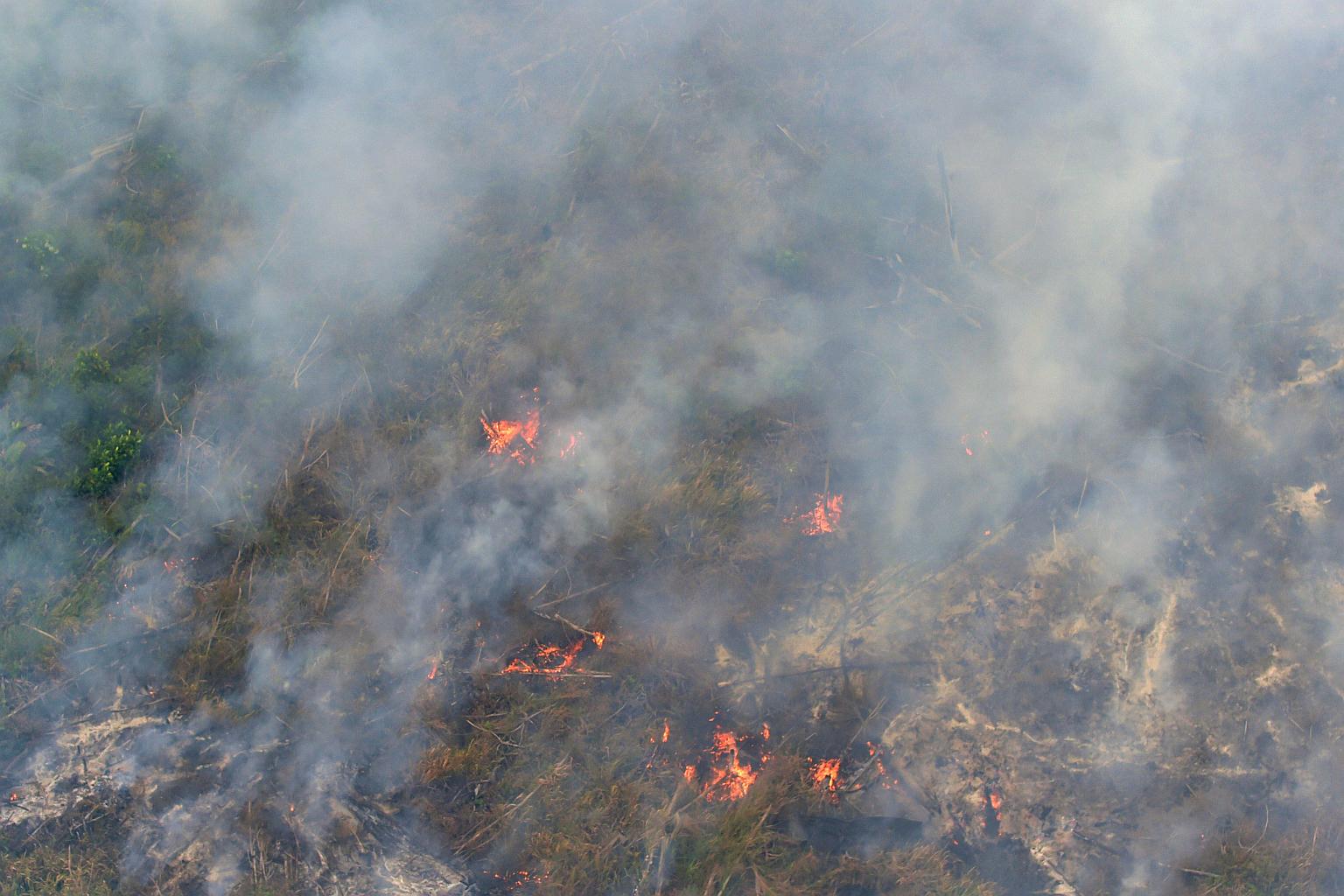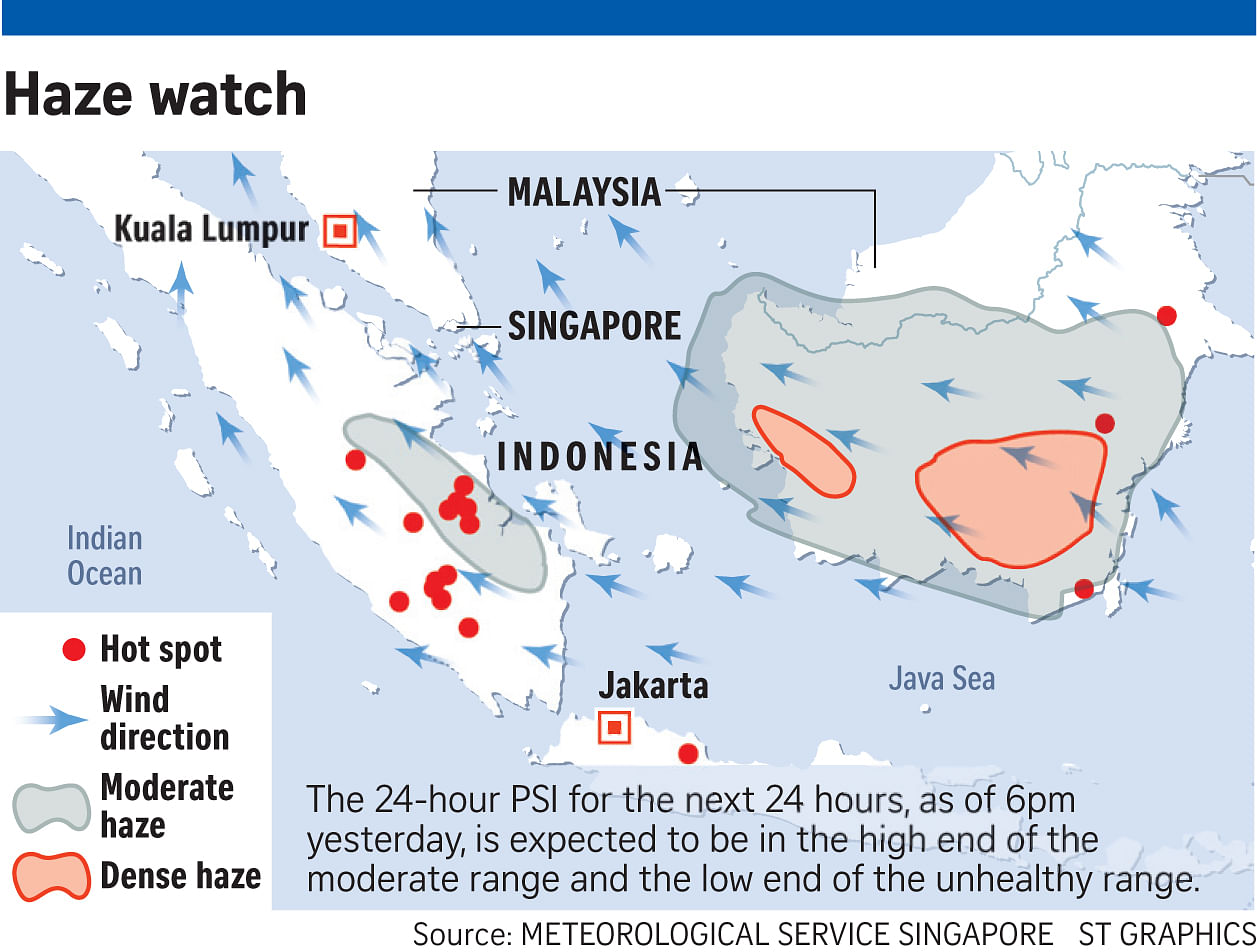Cloud hangs over enforcement of anti-haze law
Inadequate policing in Indonesia, lack of data on land ownership and usage cited as factors
Sign up now: Get ST's newsletters delivered to your inbox

This picture taken from a Kamov helicopter operated by Indonesia's Disaster Mitigation Agency shows fires burning at a concession area in Pelalawan, Riau province on Sept 17, 2015.
PHOTO: AFP
Samantha Boh, Audrey Tan
Follow topic:
A law to punish polluters who cause the haze has been lauded as an innovative and significant environment and public health law, but experts have pointed out challenges to its enforcement.
Inadequate policing in Indonesia, where the burning takes place, and a lack of reliable information on land ownership and usage there make it difficult to take errant companies to task, they say.
The law is also limited to foreign firms with a presence in Singapore, but prosecuting them here would not curb the practice of burning land there.
As National University of Singapore law professor Alan Tan said: "It is hard to see how prosecuting a few companies in Singapore can deter others when the practice of burning is so widespread and entrenched in Indonesia."
The experts were responding to queries on the recent breaches in the Transboundary Haze Pollution Act, passed in Parliament in August last year. The Act targets those responsible for causing or condoning fires if burning results in unhealthy levels of haze in Singapore.

Those guilty can be fined up to $100,000 a day, capped at a total of $2 million, for causing unhealthy haze, defined as a 24-hour Pollutant Standards Index (PSI) value of 101 or greater for 24 hours or more.
There have been two such breaches since last week, the Ministry of the Environment and Water Resources said on Tuesday.
The first was a 41-hour stretch that took place between 10am on Sept 10 and 2am on Sept 12, and the second was a 109-hour stretch that lasted from 8pm on Sept 12 to 8am on Sept 17.
The authorities said then that they are investigating both cases, which require information from various sources, such as maps, meteorological data and satellite imagery.
But experts have pointed to Indonesia's complex, often overlapping land ownership and usage rights as the primary difficulty in gaining knowledge on the sources of pollution.
"Land use and land tenure in Indonesia are governed by a complex web of national, provincial and customary laws that often compete and perhaps even conflict with each other," said Singapore Management University (SMU) law don Eugene Tan. "It is not at all clear, for the purpose of a successful prosecution, who might own a piece of land."
Dr Nigel Sizer, global director of the forests programme at United States-based think-tank World Resources Institute, agreed, saying: "Some fires occur in concessions managed by companies, but others occur outside concessions or are lit by individuals. Tools like Global Forest Watch can identify the location of the fires, but it can still be challenging to attribute individual fires to a specific actor, and in many cases, concession boundaries are highly disputed."
Indonesia's lack of willingness in sharing concession maps has long been cited as one of the main reasons that hinder law enforcement efforts in affected areas. Last month, a top Indonesian environment official said the country could not disclose plantation concession information, even from government to government, as doing so would breach Indonesian law.
SMU's Assistant Professor Mahdev Mohan, who has a research interest in public international law, said: "The absence of transparency when it comes to authoritative concession maps on land ownership, and specific data about what is happening within these concessions and surrounding areas, is striking."
Minister for the Environment and Water Resources Vivian Balakrishnan told reporters on Tuesday that he has appealed to the Indonesian Environment and Forestry minister for the names of companies currently being investigated by the authorities there. He said: "I want to make sure all executives, shareholders, owners, financiers of such companies know how seriously we take this issue, and that if we can get the evidence, we will not hesitate to take the fullest action possible against these companies."

